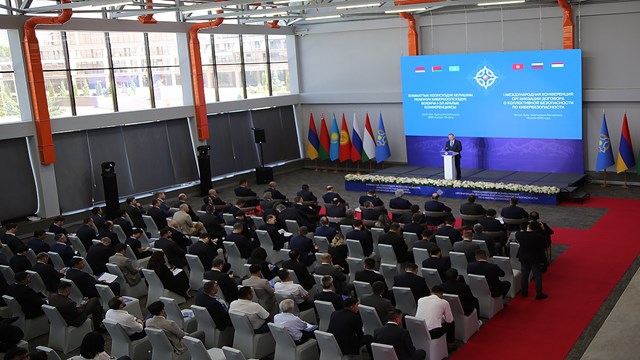
An international conference on cybersecurity was held in Kyrgyzstan
An international conference on cybersecurity was held in Kyrgyzstan
Kyrgyzstan, which holds the rotating presidency of the Collective Security Treaty Organization (CSTO), hosted an international conference on cybersecurity among member states.
More than 150 delegates, including representatives from law enforcement agencies, public institutions, IT, and corporate structures operating in the field of cybersecurity, attended the conference held in a hotel conference hall in the city of Cholpon-Ata in the Issyk-Kul Region.
Three themed panels at the conference addressed the following topics: combating cybercrime, cyberterrorism, and cyber espionage; developing mechanisms for operational information exchange and coordination among countries; and protecting critical information infrastructure in the public and corporate sectors.
Participants included the Security Council Secretaries of CSTO member states—Kyrgyzstan, Kazakhstan, Russia, Belarus, and Tajikistan—as well as the Shanghai Cooperation Organization (SCO) Secretariat, senior officials of relevant institutions from CSTO member states, and experts attending the cyber training held within the scope of the conference.
Cyberattacks raise concerns
Kamchybek Tashiev, Deputy Chairman of the Cabinet of Ministers and Chairman of the State Committee for National Security of Kyrgyzstan, stated that this conference provided a unique platform for sharing knowledge, experiences, and solutions that could lay the groundwork for strengthening cybersecurity at both national and international levels. “We hope the conference will allow us to develop practical steps to improve the security of our information systems,” he said.
"Cyber threats are becoming increasingly complex and have more destructive consequences," said Tashiev. He outlined the measures taken against cybercrimes in the public sector, noting that the Cybersecurity Law was adopted in Kyrgyzstan in 2024, and that a digital forensic laboratory and a cybersecurity operations center had been established.
Tashiev shared that five million cyberattacks had been recorded in the country since last year, 70% of which had been detected and neutralized, while the remaining 30% were of low criticality.
Azamat Osmonov, Head of the Department for Oversight of Presidential and Cabinet of Ministers’ Decisions under the Presidential Administration, emphasized that cybersecurity is no longer solely a domestic issue and proposed recommendations for joint efforts.
Kyrgyzstan's Security Council Secretary Baktybek Bekbolotov pointed out that cyberattacks pose a threat to national security, stating, “This situation is particularly important for CSTO member countries and their partners, as differing interests intersect within our area of responsibility.”
Cyberspace has become a new domain after land, sea, air, and space
CSTO Secretary-General Imangali Tasmagambetov emphasized that there are no state borders in cyberspace and said, “Cyberspace has essentially become the fifth domain where various political and military forces confront each other, following land, sea, air, and space.”
Tasmagambetov underlined that countries resisting the development of a legal framework for relations in cyberspace are themselves contributing to the emergence of cyber threats.
He noted that a kind of "arms race" is underway in the field of cyber technologies and pointed out that the absence of a deterrence mechanism in cyberspace leads to the potential emergence of "cyber dictatorships."
Belarus Security Council State Secretary Aleksandr Volfovich stated that cyber attackers target any system they can access, regardless of whether it belongs to an individual, private, or public institution, and emphasized the need for new knowledge, experience, and innovation.
Kazakstan's Security Council Secretary Gizat Nurdauletov said, “Traditional border protection has lost its relevance. Crime has gone online, and people have become part of digital platforms. In this context, Kazakhstan is gradually moving toward a 'zero trust' approach. Modern problems require systematic coordination and accountability.”
Deputy State Secretary of Belarus's Security Council Aleksandr Neverovskiy shared that 88.3 million cyberattacks were recorded in Belarus during the January–June period of 2025.
Deputy Secretary of the Russian Security Council Aleksey Shevtsov reported that 208,000 cyberattacks were recorded in the Russian Federation in 2024.